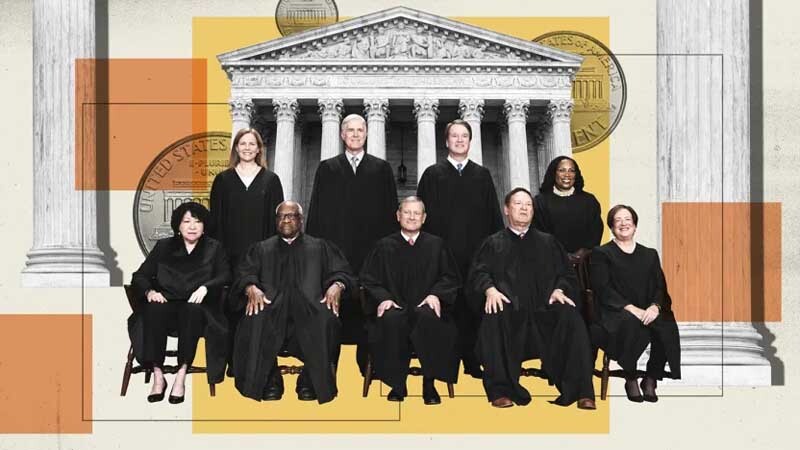 News Staff
News Staff![]() -
April 6, 2023 -
Law & Order -
Supreme Court
Ethics no man's land
-
18.5K views -
0 Comments -
0 Likes -
0 Reviews
-
April 6, 2023 -
Law & Order -
Supreme Court
Ethics no man's land
-
18.5K views -
0 Comments -
0 Likes -
0 Reviews

John G. Roberts, Jr., Chief Justice of the United States; Clarence Thomas, Associate Justice; Samuel A. Alito, Jr., Associate Justice; Sonia Sotomayor, Associate Justice; Elena Kagan, Associate Justice; Neil M. Gorsuch, Associate Justice; Amy Coney Barrett, Associate Justice; Ketanji Brown Jackson, Associate Justice.
DLNews JTFMax:
Critics say the justices operate in an 'ethical no man's land' because they don't have a code of ethics. They've been questioned over anonymous leaks to reporters, industry-funded educational seminars, accepting gifts, charitable fundraising, vacationing with litigants and their spouses whose cases are pending before the Court, and more.
The Supreme Court, with its six-to-three conservative majority, has broken norms that have eroded public trust and threatened the integrity of American democracy. In addition to a decision last June reversing Roe, recent rulings have left large sections of the country feeling alienated and disenfranchised by abortion, gun laws, and religious freedom.
These developments have brought ethical questions to the forefront of public discourse. As a result, some citizens' groups and even a congressman have called for creating a code of ethics that would make the Supreme Court subject to similar rules as other federal judges.
But the Court has long rejected this approach. Instead, Chief Justice John Roberts has argued that the Constitution grants the Supreme Court "inherent" judicial authority to manage its practices and procedures, so it should be free from disciplinary oversight.
Justices have a history of evading recusal, especially in controversial cases. This is not a new phenomenon, but it has become increasingly pronounced due to the politicization of the judicial confirmation process.
The heightened politicization of the appointment process reflects a new threat to the Court's legitimacy and efficacy, which was not recognized in the past. The increasing politicization of judicial selection raises the possibility that recent partisan conflicts may arise more readily, triggering the reasonable appearance standard for recusal. This severely threatens the Court's legitimacy because it forces the justices into a tricky balancing act between their institutional needs and public perception.
Justices have a history of making secret speeches to gain control over the political process. During the 1950s, they were under intense pressure from the government to weaken free speech protections by upholding laws like loyalty oaths.
The Court's most prominent prickly justice, Hugo Black, was born into a feisty family in rural Clay County, Alabama, where he called himself just an "ol' hillbilly." He had no formal education and was dressed in homespun clothes.
But he had the drive and the ambition to get a seat on the Court. And when he did, it would be one of the most critical shifts in the Court's history, creating a new vision for individual rights and civil liberties in America.
During his speech Thursday, Gorsuch praised the Federalist Society's goals as "benign" and vowed to expound their judicial philosophies on his new Supreme Court post. He also savaged critics who have accused the group of secretly trying to take over the judiciary and other key White House positions.
There is no shortage of controversy in the judicial community over whether or not the Supreme Court needs to adopt a code of ethics. However, having a set of standards to guide judges is essential for various reasons, most notably that it provides the framework to address a broad range of complaints from the public about their experiences with the Court. In addition, it is an essential tool for ensuring that justice is served promptly and fairly. Finally, a robust code of ethics has many benefits, including increased confidence in the Court's ability to handle severe cases.
A properly drafted code of ethics should include a robust and transparent process for determining ethical violations. A code of ethics should also have an effective system for resolving disputes without compromising the integrity of the Court.

Desert Local News is an invitation-only, members-based publication built on fact-checked, non-biased journalism.
All articles are publicly visible and free to read, but participation is reserved for members—comments and discussion require an invitation to join.
We cover local, state, and world news with clarity and context, free from political agendas, outrage, or misinformation.